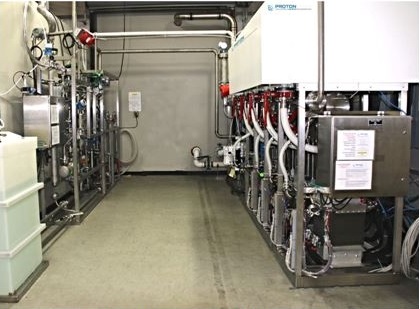Editor’s note: The hydrogen generator described here provides another way to store surplus wind-generated power.
Proton OnSite, developer of the Proton Exchange Membrane (PEM) water electrolyzer technology, recently announced the commercial launch of the 1 and 2 Megawatt (MW) M Series PEM Hydrogen Generation systems. At the 2 MW level, the new M Series provides a 13-fold increase in hydrogen production compared to other commercial PEM systems. In combination with greater production capacity, the M Series reduces the capital cost per kW of producing hydrogen by over 50%.
“Proton OnSite is the only PEM electrolyzer producer with well over 2,000 systems installed in more than 75 countries over the last 18 years”

Proton OnSite’s M1 of the new M-Series megawatt platforms sit in a 40-ft shipping container and generate more than 200 m3 of hydrogen/hr. The M2 system generates more than 400 m3 hydrogen/hr. The M-Series modular design allows for an almost unlimited range of project sizes.
The growth of renewable energy has created a need for large scale energy storage. The M Series addresses this by offering scalable cost effective conversion of excess, stranded or curtailed power to hydrogen offering a carbon-free solution for the industrial scale storage of energy for use in chemical processes, fuel-cell vehicles, biogas production, and injection into natural-gas pipelines.
“Proton OnSite is the only PEM electrolyzer producer with well over 2,000 systems installed in more than 75 countries over the last 18 years,” said Robert Friedland, President and CEO of Proton OnSite. “It’s important to understand that a functioning PEM electrolyzer is not overly complicated to build. The real challenge comes in making systems rugged and reliable for real industry applications. Proton is the only PEM electrolyzer company that has the installed base, experience and time in the market. This experience has been a key leverage point for us in introducing this system.”
PEM technology’s ability to rapidly respond to renewable energy input makes it the preferred method for electrolysis. In addition, annual maintenance costs are significantly less than more traditional alkaline electrolysis technologies. The M Series also offers a cost-effective approach for power-to-gas applications and an economical alternative, compared to delivered hydrogen, in many large industrial, food, and pharmaceutical markets. The modular design of the M Series enables solutions for an almost unlimited range of project sizes.
“The launch of our M Series opens new market opportunities for us,” said David Bow, Senior VP Sales and Marketing. “This offers solutions to address energy storage needs that can affect increased productivity of stranded or underutilized renewable energy sources, helping to further reduce greenhouse gas emissions. In addition, as many automakers have continued success reducing emissions through increased fuel cell based car sales, the need for larger capacity hydrogen fueling stations will be required and we are ready with our M Series product line to meet this need. The 2 MW unit can fuel at least 200 cars daily.” Navigant Research, projects the value of energy storage for wind and solar integration to exceed $30 billion worldwide by 2023.
Proton Onsite
www.protononsite.com
Filed Under: Energy storage, News




